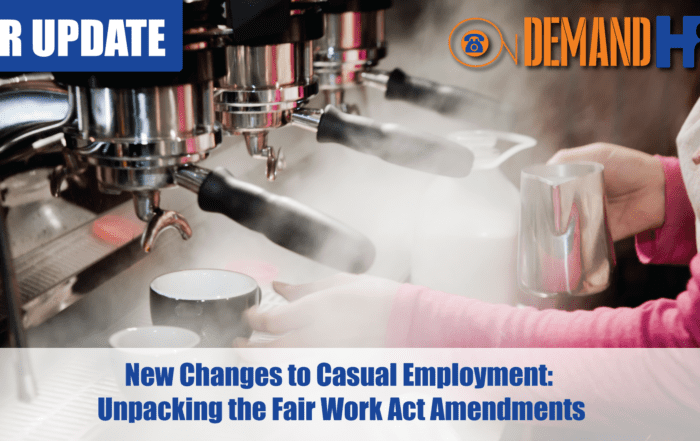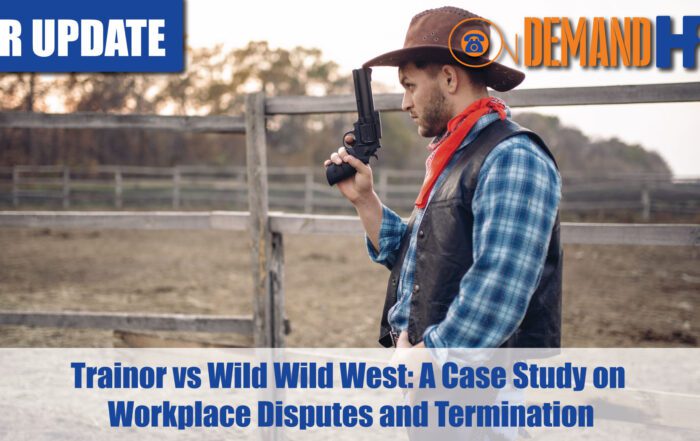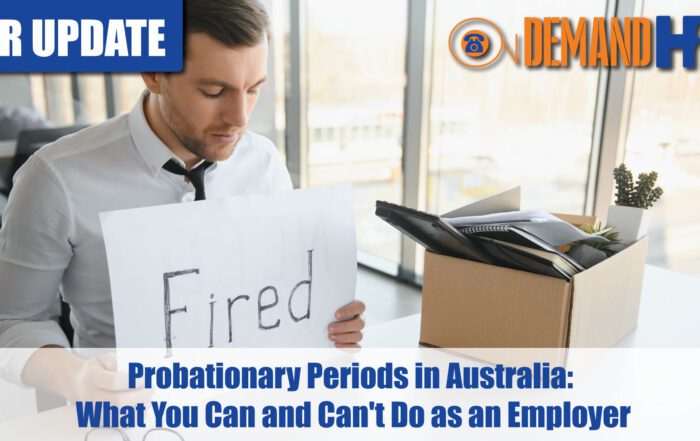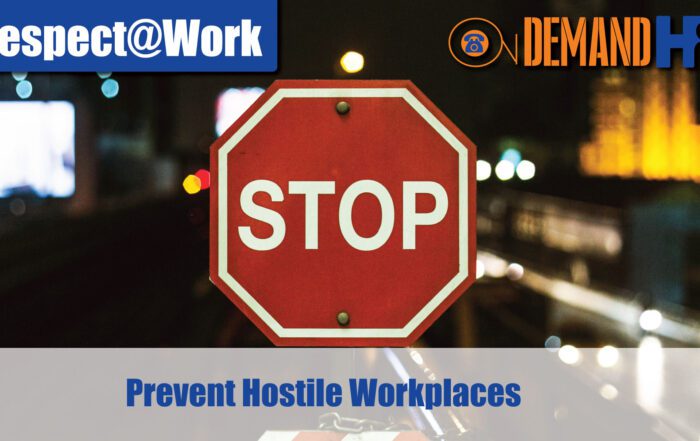Mandatory Vaccination In The Construction Industry
Hello, may name is Andrew Koleda from On Demand HR as today we are going to be tackling and offering some of our thoughts on the highly charged topic of mandatory vaccinations in NSW workplaces. If I am honest with you, we had significant internal debate on if we should be releasing any content on this subject, at the risk of polarising any individual or business owner as our observations have been that this issue is highly divisive and one which both businesses and individuals feel strongly one way or the other with little in the middle.
Ultimately, we have resolved that we have an obligation to our audience to discuss the current state of play as at 11 August 2021, some of the proposed legislation in this space, the case for mandatory workplace vaccinations balanced against some of the inherent risks as well as our current advice in this space for clients. We do this not to advocate one position or another, but rather to inform and let our audience in to some of the conversations we are having with business as well as internally and ultimately, allow individual businesses make a more informed decision with regards to a Workplace Relations Strategy that is right for them.
Finally, before I get into the content, for the purposes of this video we will be sticking to the workplace relations side of this debate, and much of what we have to cover today will ultimately be decided in the courts and commissions, and therefore we must say that this commentary is for information purposes and prior to make any decisions we strongly encourage you to seek independent advice regarding your individual circumstances.
If you are watching this on social media, this is part of a longer session on this subject matter which you can view by visiting ondemandhr.com.au or by using the link in this post.
Let’s move on to the subject of mandatory vaccination directives in the NSW construction industry. Effective as of 11 August 2021, construction workers in the current affected LGA’s will require at least some level of vaccination in order to be able to return to work.
They will be required to provide evidence that they have had at least two doses of a Covid-19 vaccine, one dose of a Covid-19 vaccine at least 3 weeks prior to returning to work or at least one dose of the vaccine and if this was administered less than 3 weeks ago a negative Covid test from the past 72 hours.
As a result of this, earlier this week On Demand HR has met with in excess of 20 construction business owners to better understand their concerns regarding these new directives. Many of them have advised that up to 70% of their workforce, many of them who live in an affected LGA are hesitant to receive a covid vaccination for a variety of reasons, and it seems clear to us already that the NSW governments directive are going to have significant effect on construction businesses, and in many cases prevent them from resuming operations of their construction sites.
Construction businesses are also concerned that the definition of an “affected LGA” can be rapidly expanded by the NSW state government as evidenced by the inclusion of some suburbs in Penrith over the weekend.
In addition to this, construction businesses expressed that some principal contractors and large builders have either put in place, or are planning to put in place mandatory vaccination policies on an ongoing basis, which may in turn force them to adopt these policies for their business in order to keep the business functioning and potentially assume the liabilities regarding workers compensation, unfair dismissal and discrimination discussed earlier.
In some cases, regardless of the view of the business owner or directors, the sheer number of conscientious objectors to vaccination, means that effects for businesses are likely to be inevitable.
We note that Mulgoa MP Tanya Davies in response to this is currently seeking to introduce a private members bill to reverse these industry specific mandatory vaccinations. Again we are forced to seperate the debate around vaccination & lockdowns in general, from the mandatory directive to get vaccinated for employees.
As we understand it, the public health order enforcing this which was introduced on 26 June 2021 has seen no less than 22 amendments since its introduction, so in some ways it is no wonder that many construction businesses are lacking confidence in government directions, and are adopting a “wait and see” response to this directive.
From an On Demand HR perspective we have similar reservations around workers compensation, unfair dismissal and adverse action for our clients in relation to these directives with not much clarity in sight. Further to this, we have some concerns that these directives may also be considered a major workplace change requiring consultation with employees under the Fair Work Act and Modern Awards.
At this time we would like to invite you to share your opinion, views and experiences and if you would like to have a discussion about this and strategies for your workplace, please do not hesitate to reach out to us by visiting ondemandhr.com.au.
Finally, if you are watching this on social media, this is an extract from a longer session on this subject matter where we tackle this challenging question from multiple angles and perspectives and you can view the entire session on our website at ondemandhr.com.au.
From the entire team here at On Demand HR we hope that you are staying safe and we are ready and available to help support your business in any way that we can.
Share the HR or workplace relations challenge facing your business and one of our experienced consultants will be in touch within 24 hours with a strategic action plan or discover the best strategy yourself by accessing out free online training library.
Transcript
Hi There, Andrew Koleda from On Demand HR here with an important update regarding casual employment for business owners. The topic of casual employment has been brought to the forefront in recent years through decisions in the cases of WorkPac vs Skene & WorkPac vs Rossato. In this short video, we are going to unpack the rulings as well as the result of the recent appeal, changes implemented in the Fair Work Act to limit the initial scope of the precedent as well as the implications and recommendations for businesses to undertake to their Workplace Relations affairs in response to all of this and maintain compliance.
Both these significant cases against the same labour hire company WorkPac ended up with rulings that determined that the both employees who were engaged as casual employees were in practice full time employees due to the regular and systematic nature of the work they carried out. This lead to a ruling that the employees were entitled to backpay of entitlements such as leave, however the most significant outcome was that in determining the amount owing to the employees, the Federal Court did not consider the casual loading that was already paid to the employees as offsetting the leave entitlements owing.
This means that hypothetically if the employee was being paid $100 per hour plus a $25 per hour casual loading, the High Court considered their base rate of pay was $125 per hour and the respondent was ordered to backpay entitlements based on this higher rate and the additional $25 was not considered to offset the amount owing. No doubt you can see why this caused significant fear in the business community with concerns about massive payouts of entitlements across the entire spectrum of the economy.
The Federal Government in response as part of the Fair Work Amendment (Supporting Australia’s Jobs and Economic Recovery) Bill 2021 in response to the Covid 19 pandemic sought to firm up the definition of a casual employee to close this potential loophole and provide certainty to business. Most notably under section 15A of the act, they define casual employment as “ where an offer of employment is made by the employer on the basis that the employer makes no firm advance commitment to continuing and indefinite work according to an agreed pattern of work for the person, and the offer is accepted on that basis, resulting in the person becoming an employee.”
In effect, what this means is that the test of casual employment is made at the time of offering employment and cannot not change during the course of the employment based on working patterns or other factors unless mutually agreed between the employer and the employee. Even further, provisions were introduced with the effect of allowing employers to offset any casual loading already paid against entitlements in the event future orders are given against an employer.
The legislative changes have recently lead to the case of Workpac vs Rossato to be overturned and under the new regulations Roassato was considered a casual employee by the new definition.
With all of this now in the history books, it seems like a win for employers engaging casual staff as well as a win for employees protecting the higher take home wages from 25% casual loading rates. So what should businesses do to protect themselves?
We have a couple of recommendations for our clients including:
- Using the opportunity to review their employment contracts with an emphasis on clearly identifying the nature of employment as a casual employee as well as identifying the inclusion of a casual loading
- Inclusion of preventative clauses to offset casual loading paid against any other employee entitlements which may be owing in the future
- Review compliance with the National Employment Standards where an additional provision has been included providing for an obligation to offer casual conversion after 12 months. Often it is good practice to include this in the initial offer of employment to prevent compliance concerns in the future. We note that once employees discover that they will actually be earning less take home pay by converting to part time or full time employment they choose to remain as casual employees despite what you might hear in the media.
If you would like some assistance in determining if your business has any compliance risk regarding casual employees or any other area of your Workplace Relations affairs, please reach out to us by visiting ondemandhr.com.au and we will be only too happy to help.
Once again, Andrew Koleda from On Demand HR and looking forward to seeing you all in the next update.






